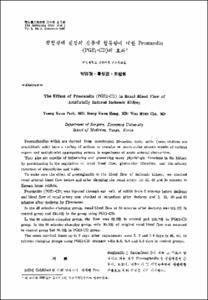핍혈상태 신장의 신동맥 혈류량에 대한 Prostandin(PGE1-CD)의 효과
- Keimyung Author(s)
- Park, Young Kwan; Cho, Won Hyun
- Department
- Dept. of Surgery (외과학)
- Journal Title
- Keimyung Medical Journal
- Issued Date
- 1987
- Volume
- 6
- Issue
- 2
- Abstract
- Prostaglandins which are derived from unsaturated 20-carbon fatty acids(most of them are arachidonic acid) have a variety of actions to vascular or-nonvascular smooth muscle of various organs and anti-platelet aggregating actions in experiment of acute arterial obstruction. They also are capable of influencing and preserving many physiologic functions in the kidney by participating in the regulation of renal blood flow, glomerular filtration, and the urinary excretion of electrolytes and water. To make sure the effect of prostaglandin to the blood flow of ischemic kidney, we checked renal arterial blood flow before adn after clamping the renal artery for 45, 60 and 90 minutes in korean house rabbits. Prostandin (PGE1-CD) was injected through ear vein of rabbit from 5 minutes before declamp and blood flow of renal artery was checked at immediate after declamp and 5, 15, 30 and 60 minutes after declamp by Flowmeter. In the 45 minutes clamping group, renal blood flow at 60 minutes after declamp was 102.9% in control group and 130.0% in the group-using PGE1-CD. In the 60 minutes clamping group, the flow was 92.9% in control and 124,7% in PGE1-CD group. In the 90 minutes clamping group, only 30.3.% of original renal blood flow was returned in control group but 76.3% in PGE1-CDgroup. The mean survival times up to 7 days after experiments were 7, 7 and 3.8 days in 45,60,90 minutes clamping groups using PGE1-CD compare with 6.8, 5.6 and 2.2 days in control groups.
- Alternative Title
- The Effect of Prostandin (PGEl-CD) in Renal Blood Flow of Artificially Induced Ischemic Kidney
- Publisher
- Keimyung University School of Medicine
- Citation
- 박영관 et al. (1987). 핍혈상태 신장의 신동맥 혈류량에 대한 Prostandin(PGE1-CD)의 효과. Keimyung Medical Journal, 6(2), 341–345.
- Type
- Article
- Appears in Collections:
- 2. Keimyung Medical Journal (계명의대 학술지) > 1987
1. School of Medicine (의과대학) > Dept. of Surgery (외과학)
Items in Repository are protected by copyright, with all rights reserved, unless otherwise indicated.
